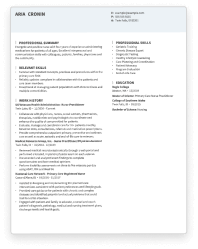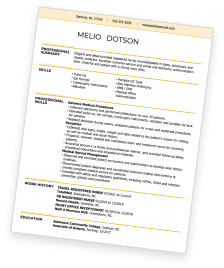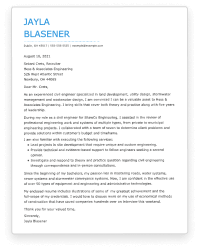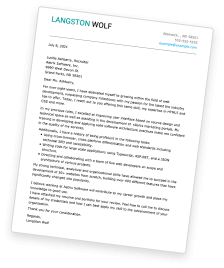Program Manager Resumes: Overview
As a program manager in the film industry, you work behind the scenes, orchestrating projects and ensuring their seamless execution.
You research and implement new programs, build program budgets, communicate with distributors, and collaborate with team members to create marketing strategies to bring in audiences.
Film industry program managers work in several settings, including:
- Film Production Companies
- Entertainment Studios
- Event Management Agencies
- Streaming Platforms
- Film Festivals
Program management requires organizational prowess, creativity, and leadership skills. Your knowledge of the film industry, the ins and outs of film distribution, and proven project management skills make you an essential part of the team.
At Hloom, you can start building a standout resume today! We can help you showcase your expertise and skills as a program manager and get your resume noticed.
For more resources, explore our professional resume examples and downloadable templates to create a resume that reflects your unique strengths.
Senior Program Manager Resume Example
Take a look at this first example of a program manager’s resume. Its visually appealing design and chronological format work together to showcase the program manager’s extensive experience and impressive skillset.
Here’s why this resume example stands out:
Elegant Design:
This example of a program manager resume uses color, attractive font, and graphic elements to create a visually appealing resume.
Using lines and larger font for headings to separate each section makes it easy to find specific information quickly and adds to the aesthetic appeal.
Professional Summary:
This program manager’s resume begins with a persuasive and informative professional summary statement. In three concise sentences, the candidate explains their experience level, most relevant skills and personal traits that will make them an excellent fit for the program management job.
Emphasizes Experience:
This example resume for a program manager uses a chronological format to highlight the candidate’s twelve years of experience in film programming. Under each job listed, the applicant includes well-written bullet points to showcase their real-world industry experience.
Action Verbs:
This resume example engages the reader by using action verbs throughout the document. Strong verbs like created, secured, and developed create persuasive sentences that help the hiring manager visualize you doing the job.
Program Manager Resume Example
This second program manager resume example balances aesthetics and content to emphasize their skills and qualifications instead of their job history.
When you are applying for a program manager position but have limited experience, a well-structured functional resume like this one can demonstrate your qualifications to hiring managers.
This resume is an excellent example for several reasons:
Visual Appeal:
This program manager’s resume uses color, bold headings, and columns to create a well-organized and attractive resume design. It balances white space and text to avoid overcrowding the page while still providing all the necessary information.
Showcases Qualifications:
This resume example for a program manager uses a functional format that emphasizes the candidate’s skills and qualifications. Because the program manager does not have experience in the exact same role, they wisely use a format that focuses on the candidate’s skills and qualifications for the job.
Measurable Achievements:
This resume demonstrates the candidate’s impact in previous roles by including numbers and percentages.
For example, one bullet states the candidate “Provided input during the creation of long-term goals and carried out assigned tasks, reaching deadlines 95% of the time.” In another bullet, they demonstrate their ability to work with others by writing, “Collaborated closely with a team of 20 with a diverse array of talents and responsibilities.”
Summary Statement:
This resume example features a well-written summary statement that showcases the candidate’s passion for the industry and excitement for the job role. It also emphasizes their transferable skills and experience to convey their qualification for the position.
How to Write a Program Manager Resume
When you apply for a program manager position, you want a well-written resume that will grab the attention of hiring managers and recruiters. That starts with a proper resume outline to make your unique skills and qualifications stand out from the rest.
Showcase your most relevant skills, accomplishments, and qualifications in each section of your resume in a manner that is both logical and engaging.
For more help, check out our comprehensive guide on how to make an effective resume!
Pick a Format
To start writing your resume, choose a format that best highlights your program management experience and skills.
A chronological format is the most common choice. It will be familiar to hiring managers and easily read by automated applicant tracking systems, making it a good choice for many people. It works especially well for someone with several years of work experience because it emphasizes work history more than skills or education.
However, a functional resume may be the key to getting noticed if you are just beginning your career as a program manager or transitioning from a different industry. This unique resume format emphasizes relevant skills and abilities instead of previous work experience or job titles.
Or, you can choose to blend the best parts of both formats in a combination resume format! The combination format visually balances the focus on skills and experience, making it a great choice when you have relevant experience but want to showcase your skills to advance your career.
Contact Information
It may go without saying, but you should place your contact information prominently at the top of your resume. Include your full name, phone number, email address, and location.
You can also include your LinkedIn profile if you like. One word of caution: be sure your information is accurate and that your email address and LinkedIn profile are up-to-date and professional.
Resume Summary or Objective
As a program manager, you are familiar with conveying complex information concisely. Use this same skill to craft a compelling summary or objective that provides a snapshot of your program management qualifications and career goals.
Focus on your most relevant skills and experiences in 2-3 brief sentences.
A professional summary is the better choice if you have relevant work experience you can share along with your skills.
However, if you are new to program management, you can use an objective statement to demonstrate your interest and enthusiasm for the job.
Work History
Next, you will detail your relevant work experience, starting with the most recent position.
Each job entry should include the job title, name of employer, location and the dates you worked there.
Under each job entry, use bullet points to detail your responsibilities and accomplishments.
Use quantifiable metrics to demonstrate your impact in each program management role.
For example, “Wrote and presented 50 original film descriptions,” or “Led communication efforts across 6 emerging digital platforms.”
These bullet points allow you to present yourself as the perfect candidate for the program manager job! Focus on your best and most relevant accomplishments to make a solid first impression.
Skills
In a separate section, highlight your technical skills, including proficiency in project management tools and budgeting software. Then, include hard skills, such as strategic planning and budget oversight, and soft skills, like leadership and collaboration.
Need more ideas for your skills section? We’ve got you covered. Scroll down to find out the top hard and soft skills for a program manager resume.
Education
Let the hiring manager know a little more about you by including your educational background, including degrees, institutions, and graduation dates.
Additional Sections
Consider adding sections that strengthen your program manager resume if space allows.
For example, you can list certifications, awards, or professional association memberships.
Key Skills For Program Manager Resumes
Program managers need specific hard skills and soft skills to succeed in the film industry. Including the right skills on your resume will get the attention of recruiters and hiring managers.
You should tailor your resume to the job you are applying for by highlighting your unique skills and qualifications. To get you started, we have compiled some of the most popular skills for a program manager resume.
Top 5 Hard Skills for Program Manager Resumes
- Strategic Planning: Highlight your ability to develop and execute strategic plans for film programs, ensuring alignment with overall business objectives.
- Budget Management: Proficiency in managing budgets for film projects and optimizing resources while delivering high-quality results is a must-have skill for program managers.
- Project Management Tools: A good set of computer skills showcasing your familiarity with project management software and tools for efficient planning, execution, and monitoring will demonstrate your ability to keep teams organized and projects on track.
- Event Coordination: Your expertise in organizing and managing film-related events, premieres, and festivals will make you stand out as a candidate for the program manager job.
- Stakeholder Relationship Management: Building and maintaining positive relationships with diverse stakeholders in the film industry is essential to success, so let hiring managers know you are ready to take on the challenge.
Top 5 Soft Skills for Program Manager Resumes
- Leadership: The ability to lead and inspire teams to achieve project goals is crucial for success as a program manager.
- Creativity: Let hiring managers know you have a knack for the innovative thinking needed to bring creative elements to film programs and events.
- Communication: Clear and effective communication with teams, stakeholders, and partners is a skill that employers will be looking for.
- Adaptability: Program managers must have the flexibility to navigate the dynamic and ever-changing landscape of the film industry.
- Problem-Solving: The ability to address challenges and find practical solutions to ensure project success is essential to being a program manager.
Enhance your program manager resume by emphasizing your most relevant and sought-after skills. To stand out as a job candidate, include a combination of hard skills, soft skills, and technical knowledge to demonstrate your abilities.
Top Certifications for Program Manager
Including professional certifications can elevate your program manager resume and help you stand out as a candidate committed to excellence. Here are a few examples of certificates that can help you succeed as a program manager:
- Project Management Professional (PMP): Achieve PMP certification to validate your proficiency in project management, a crucial skill for program managers.
- Certified ScrumMaster (CSM): Obtain CSM certification to demonstrate expertise in agile project management, which is particularly valuable in dynamic industries like film.
- Program Management Professional (PgMP): Earn PgMP certification to showcase advanced program management skills and experience.
- Business and Management of Entertainment: UCLA and other notable universities offer courses and certifications in the business of entertainment. These foundational courses will provide a thorough understanding of the entertainment industry, which can be valuable as a program manager.
Relevant certifications add credibility to your program manager resume. Earning professional certifications demonstrates your dedication to professional growth and development and keeping your program management skills fresh!
7 Tips For Writing A Program Manager Resume
Tailor Your Resume: Customize your resume for each application, emphasizing the most relevant program management skills and experiences. Use keywords from the job description to demonstrate your alignment with the role and to pass initial screening by applicant tracking systems.
For example, if the job posting mentions that you need knowledge of a specific software, be sure to include information about your experience with that software in your resume.
Highlight Creative Leadership: Showcase your ability to bring creative elements to film programs, demonstrating a unique approach to project management.
Many program manager jobs will require a strong visual aesthetic related to film and media or working with a wide range of stakeholders. Your ability to foster creativity while keeping programs on track will make you a top candidate!
Use a Visually Appealing Design: The film industry is a visual business. When creating your resume, choose a visually appealing design that reflects your eye for aesthetic appeal and your ability to organize and conceptualize information for your audience.
Technology Proficiency: Emphasize your proficiency in project management tools, presentation software and other relevant technologies in business and the film industry.
Showcase Measurable Impact: Quantify your achievements to provide a clear picture of your impact on film programs and events. Use numbers and percentages to demonstrate that you contributed significantly in your previous jobs.
Include a Portfolio: If applicable, consider including a portfolio of successful film programs, events, or projects you’ve managed. You can include a URL or QR Code to an online portfolio or mention that you have a physical portfolio available upon request.
Proofread: Avoid typos and grammatical errors by thoroughly proofreading your resume. Consider seeking feedback from peers or professionals to get an objective opinion about your resume content.
Helping Job Seekers Like You


Save Time With Our Resume Builder
Key Takeaways
- Customize your resume for each application, emphasizing relevant skills and experiences.
- Use metrics to highlight the impact of your program management efforts, providing a tangible demonstration of your success.
- Showcase your ability to bring creative elements to film programs, setting yourself apart in the industry.
- Highlight your proficiency in project management tools and technologies relevant to the film industry.
- Illustrate successful collaboration with diverse stakeholders, a critical skill in the dynamic film industry.
Save Time With Our Cover Letter Builder












